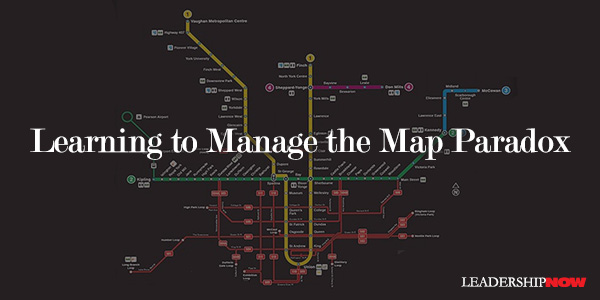 |
 |
07.07.23

Learning to Manage the Map Paradox
WE ALL HAVE mental maps that we use to explain the world as we experience it. They also provide us with a guide to our actions. But here’s the thing. These mental maps are based on yesterday. Donald Sull calls it the Map Paradox. In The Upside of Turbulence, he writes, “In a turbulent world, people must make long-term commitments based on a mental map they know to be flawed. The paradox arises in any situation where progress requires both long-term commitments from many people and adaptation to changing circumstances.” All mental maps are static representations of a shifting situation, simplifications of a complex world made without the benefit of knowledge that will only emerge in the future. They remain always and everywhere provisional, subject to revision or rejection in light of new information. The paradox of the map demands a delicate balance between commitment and revision, stability and flexibility. Striking the balance is difficult, but possible. Of course, mental maps come in all varieties. There are mental maps that are based on values that anchor us no matter what the circumstances present us with. We all possess personal mental maps that are based on the interpretation of our experiences in life so far. These kinds of maps are often subject to revision as we grow, understand more, and gain new perspectives. All mental models are working hypotheses. Whether your mental maps are explicit or implicit, they all perform three specific functions: “They emphasize important categories, clarify relationships among variables, and suggest appropriate action.” Mental maps create biases. As we take our maps into the future—especially an uncertain future (as most futures are)—they are subject to revision when scrutinized under the light of tomorrow’s reality. Our working hypotheses “provide imperfect representations of a complex and fluid world.” The best way to avoid the Map Paradox is to continuously place your mental model up against models that are different from yours. Look for clues as to what does not support your view of the world. Consider a revolution of thought rather than simply rationalizing away the incongruities you find. Entrepreneurs often find themselves in the Map Paradox because once they build a mental model around their idea, they look for supporting information and fall prey to what they do not know. “A systematic study of three hundred start-ups found that persisting with the initial business plan was the best single predictor of failure one year after founding—nine of ten entrepreneurs who stuck to their initial business plan without revision failed.” Mental models are a necessary part of who we are. They help us to move efficiently through life, but we need to learn to manage them so we aren’t derailed by them in the reality of changing circumstances. 
Posted by Michael McKinney at 10:39 AM
|
BUILD YOUR KNOWLEDGE
 

How to Do Your Start-Up Right STRAIGHT TALK FOR START-UPS 
Grow Your Leadership Skills NEW AND UPCOMING LEADERSHIP BOOKS 
Leadership Minute BITE-SIZE CONCEPTS YOU CAN CHEW ON 
Classic Leadership Books BOOKS TO READ BEFORE YOU LEAD |